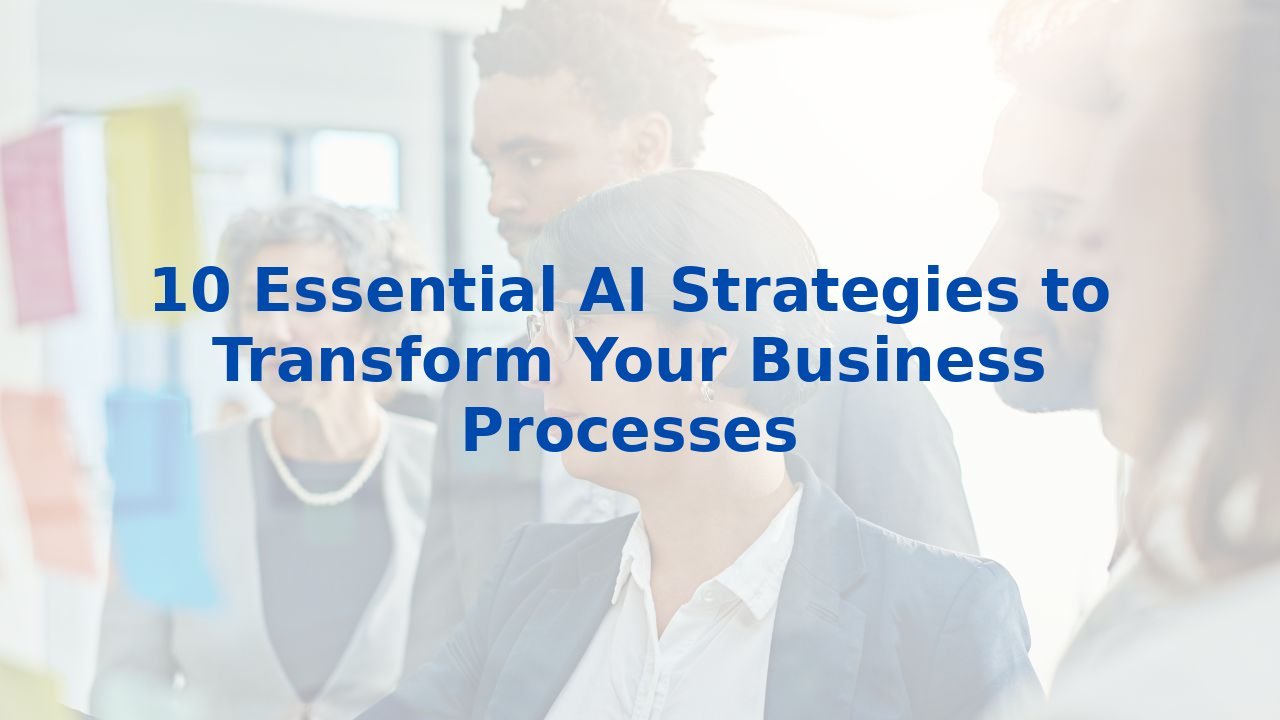10 Essential AI Strategies to Transform Your Business Processes
10 Essential AI Strategies to Transform Your Business Processes
In an era where efficiency is not just advantageous but essential for survival, organizations are turning to artificial intelligence (AI) as a transformative force. This powerful technology can streamline operations, enhance decision-making, and foster a culture of innovation. Here, we explore ten pivotal strategies for integrating AI into your business processes, showcasing the richness of its potential in enhancing efficiency.
1. Automate Meeting Management
Meetings are a staple of corporate life; however, they often consume valuable time with mundane tasks. AI tools can automate the scheduling of appointments and the capturing of crucial discussion points, letting teams focus on what truly matters. Imagine having an AI assist you in capturing detailed meeting notes, summarizing key takeaways, and sending follow-up reminders—all while you engage in meaningful dialogue.
2. Amplify Sales and Marketing Efforts
AI analytics can dissect vast streams of data to help sales teams zero in on high-value leads. By predicting customer behavior, AI empowers sales professionals to prioritize their focus effectively. Additionally, deploying chatbots on your website can resolve common customer inquiries instantly, turning potential drop-offs into sales and enhancing customer satisfaction.
3. Elevate Customer Service Standards
With AI, customer service can transition from reactive to proactive. By automating routine inquiries and analyzing service interactions, businesses can maintain high service standards while relieving human agents of repetitive tasks. AI's capacity to evaluate call quality allows for precise feedback, ensuring continuous improvement in service delivery.
4. Innovate Product Development
AI introduces a new era in product development through generative design. It allows organizations to input parameters for design goals, and AI explores numerous possibilities. Rather than proceeding with costly prototypes, companies can experiment and validate designs in a digital space, leading to efficient and innovative product outcomes.
5. Streamline Content Creation
The landscape of content creation is evolving, thanks to AI capabilities. Businesses can now produce engaging copy, analyze themes, and capture audiences’ attention at unprecedented speeds. Whether crafting product descriptions or generating reports, AI systems can free your marketing teams to strategize rather than scramble for content.
6. Reimagine Manufacturing
The manufacturing sector is leveraging AI more than ever through collaborative robots, or "cobots," designed to work alongside human workers. This fusion enhances operational safety while maximizing efficiency. AI applications also extend to recruitment in HR, where platforms can facilitate initial candidate assessments, expediting hiring processes without sacrificing quality.
7. Transform Business Process Management
AI's capabilities in business process management are vast, with techniques such as process mining revealing inefficiencies in workflows. Through data analysis, AI can unearth insights on operational bottlenecks, allowing companies to make data-driven decisions to improve performance. Further, real-time monitoring lets businesses act proactively to seize growth opportunities and address challenges as they arise.
8. Accelerate Decision-Making
AI improves decision-making by providing in-depth analysis and simulations of various scenarios. Its ability to process vast amounts of structured and unstructured data helps identify patterns that inform strategic choices, making organizations more agile and responsive in decision-making.
9. Foster a Proactive Culture
With AI, organizations can adopt a forward-looking approach by predicting market trends and operational challenges. This enhances responsiveness to changes within the landscape, positioning businesses to adapt swiftly rather than reactively.
10. Prioritize Employee Training
Integrating AI tools into business processes is paramount, but equally vital is the training of your workforce. Educating employees on how to leverage AI not only helps them understand the technology but equips them to identify opportunities for its implementation. With the right training programs, you can empower teams to transition from manual tasks to AI-driven processes seamlessly.
As AI continues to evolve, investing in workforce education on AI technologies is not merely an option; it is a necessity for future-proofing your organization and enhancing operational effectiveness.
Conclusion
The journey towards transforming your business through AI is one of embracing change, enhancing workflows, and fostering efficiency across the board. By adopting these ten strategies—from improving meeting management to reimaging manufacturing—you position your organization not just to survive but thrive in an increasingly competitive landscape. Moreover, understanding AI's capabilities and applying them is only half the equation; investing in training ensures that your team is equipped to unlock the full potential of AI. Embrace this revolution and watch as your business emerges stronger, faster, and more innovative than ever.
For organizations keen on maximizing their efficiency, exploring extensive training options can pave the way. Understanding the nuanced interplay between AI and your processes allows you to integrate these strategies harmoniously, setting a steady path towards organizational excellence.



